The History Book Club discussion

This topic is about
Rubicon
ROMAN EMPIRE -THE HISTORY...
>
SERIES - GLOSSARY - POTENTIAL SPOILERS
message 52:
by
Vicki, Assisting Moderator - Ancient Roman History
(last edited Oct 18, 2012 02:21PM)
(new)
-
rated it 3 stars
Cicero

Marcus Tullius Cicero was one of the most important men of the Late Republic. Even though he was a New Man (i.e. none of his ancestors had been consul), he attained the consulship and governed during a difficult time. He was a successful advocate and orator and much of what we know about Rome comes from his correspondence with friends and relatives, and also from his philosophical tracts.
http://en.wikipedia.org/wiki/Cicero

Marcus Tullius Cicero was one of the most important men of the Late Republic. Even though he was a New Man (i.e. none of his ancestors had been consul), he attained the consulship and governed during a difficult time. He was a successful advocate and orator and much of what we know about Rome comes from his correspondence with friends and relatives, and also from his philosophical tracts.
http://en.wikipedia.org/wiki/Cicero
The Boni
The boni or optimates were the ultraconservative faction of Roman politics. Boni means "the good men." They were dedicated to keeping the power of the government in the hands of the few and opposed to policies which would benefit the general populace. Thus the faction which opposed them was called the populares. The optimates were mostly on the side of Sulla and the populares on the side of Marius during their conflicts.
http://en.wikipedia.org/wiki/Optimates
http://en.wikipedia.org/wiki/Populares
Some of the people identified in the book as belonging to the boni are as follows:
Quintus Lutatius Catulus
http://en.wikipedia.org/wiki/Quintus_...
Quintus Hortensius, the most famous advocate in Rome until he was overshadowed by Cicero
http://en.wikipedia.org/wiki/Quintus_...
Marcus Calpurnius Bibulus (already described in a separate entry)
http://en.wikipedia.org/wiki/Bibulus
Gaius Calpurnius Piso, consul during Pompey's commision against the pirates
http://en.wikipedia.org/wiki/Gaius_Ca...
Marcus Porcius Cato the Younger (also described in a separate entry)
http://en.wikipedia.org/wiki/Cato_the...
The boni or optimates were the ultraconservative faction of Roman politics. Boni means "the good men." They were dedicated to keeping the power of the government in the hands of the few and opposed to policies which would benefit the general populace. Thus the faction which opposed them was called the populares. The optimates were mostly on the side of Sulla and the populares on the side of Marius during their conflicts.
http://en.wikipedia.org/wiki/Optimates
http://en.wikipedia.org/wiki/Populares
Some of the people identified in the book as belonging to the boni are as follows:
Quintus Lutatius Catulus
http://en.wikipedia.org/wiki/Quintus_...
Quintus Hortensius, the most famous advocate in Rome until he was overshadowed by Cicero
http://en.wikipedia.org/wiki/Quintus_...
Marcus Calpurnius Bibulus (already described in a separate entry)
http://en.wikipedia.org/wiki/Bibulus
Gaius Calpurnius Piso, consul during Pompey's commision against the pirates
http://en.wikipedia.org/wiki/Gaius_Ca...
Marcus Porcius Cato the Younger (also described in a separate entry)
http://en.wikipedia.org/wiki/Cato_the...
 p. 11
p. 11
Gaius Cassius Longinus
When we are introduced to Cassius in the novel, it is as the young Brutus' school fellow. Brutus feels he has nothing in common with this "loud and turbulent boy."
Historically, Cassius (before 85 BC – April 20, 42 BC) was a Roman senator, a leading instigator of the plot to kill Julius Caesar, and the brother in-law of Brutus.
He was married to Junia Tertia (Tertulla), who was the daughter of Servilia and thus a half-sister of his co-conspirator Brutus.
More here (including many spoilers): http://en.wikipedia.org/wiki/Gaius_Ca...
Bea, I like this very much - this gives an approximate page number of where this person is mentioned. Of course, there are many different editions so that the pagination might be varied.
 p. 13
p. 13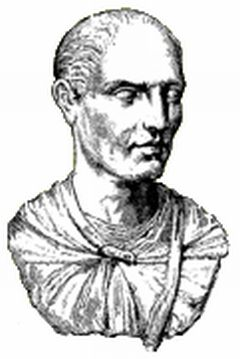
Lucullus
When he is first mentioned in this novel, Lucullus is away from Rome battling King Tigranes and Armenia.
Lucius Licinius Lucullus (118 –57/56 BC), was an optimate politician of the late Roman Republic, closely connected with Sulla Felix. In the culmination of over twenty years of almost continuous military and government service, he became the main conqueror of the eastern kingdoms in the course of the Third Mithridatic War, exhibiting extraordinary generalship in diverse situations, most famously during the siege of Cyzicus, 73-2 BC, and at the Battle of Tigranocerta in Armenian Arzanene, 69 BC. His command style received unusually favourable attention from ancient military experts, and his campaigns appear to have been studied as examples of skillful generalship.
Lucullus returned to Rome from the east with so much captured booty that the whole could not be fully accounted, and poured enormous sums into private building, husbandry and even aquaculture projects which shocked and amazed his contemporaries by their magnitude. He also patronized the arts and sciences lavishly, transforming his hereditary estate in the highlands of Tusculum into a hotel-and-library complex for scholars and philosophers. He built the horti Lucullani, the famous Gardens of Lucullus, on the Pincian Hill in Rome, and in general became a cultural revolutionary in the deployment of imperial wealth. He died during the winter of 57-56 BC. and was buried at the family estate near Tusculum.
More here: http://en.wikipedia.org/wiki/Lucullus
 p. 17 - We learn that Caesar "did all the assizes" while he was in Further Spain.
p. 17 - We learn that Caesar "did all the assizes" while he was in Further Spain.If someone knows exactly what this entails, please pitch in. From what I can gather, the assizes were a kind of circuit court in the province. I assume that Caesar would travel from place to place adjudicating disputes and punishing criminals.
 p. 19
p. 19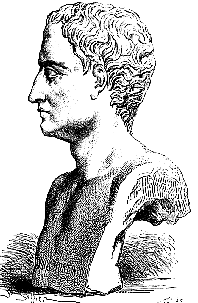
Hortentius
When we first hear of him in the novel, Aurelia ranks Caesar as the equal of Cicero and Hortensius as a famous advocate.
Quintus Hortensius Hortalus (114 BC – 50 BC) made his first speech at the bar at the age of nineteen, and shortly afterwards successfully defended Nicomedes IV of Bithynia, one of Rome's dependants in the East. From that time his reputation as an advocate was established. As the son-in-law of Quintus Lutatius Catulus (through marriage to Lutatia, daughter of Catulus and Servilia) he was attached to the aristocratic party, the "optimates". During Lucius Cornelius Sulla's dictatorship the courts of law were under the control of the Senate, the judges being themselves senators.
To this circumstance perhaps, as well as to his own merits, Hortensius may have been indebted for much of his success. Many of his clients were the governors of provinces which they were accused of having plundered. Such men were sure to find themselves brought before a friendly, not to say a corrupt, tribunal, and Hortensius, according to Marcus Tullius Cicero was not ashamed to avail himself of this advantage. Having served during two campaigns (90-89) in the Social War, he became quaestor in 81, aedile in 75, praetor in 72, and consul in 69. In the year before his consulship he came into collision with Cicero in the case of Gaius Verres, and from that time his supremacy at the bar was lost.
After 63 Cicero gravitated towards the faction to which Hortensius belonged. Consequently, in political cases, the two men were often engaged on the same side (e.g. in defence of Gaius Rabirius, Lucius Licinius Murena, Publius Cornelius Sulla, and Titus Annius Milo). After Pompey's return from the East in 61, Hortensius withdrew from public life and devoted himself to his profession. In 50, the year of his death, he successfully defended Appius Claudius Pulcher when accused of treason and corrupt practices by Publius Cornelius Dolabella, afterwards Cicero's son-in-law.
The vast wealth he had accumulated he spent on splendid villas, parks, fish-ponds and costly entertainments. He was the first to introduce peacocks as a table delicacy at Rome. He was a great buyer of wine, pictures and works of art. He wrote a treatise on general questions of oratory, erotic poems, and an Annales, which gained him considerable reputation as a historian.
More here: http://en.wikipedia.org/wiki/Hortensius
 p. 20
p. 20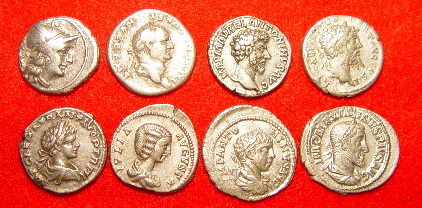
Denarius coins of various periods
Aurelia cautions Caesar that the post of curator of the Via Appia would be "ruinously expensive.... The Treasury will grant you one sestertius per hundred miles, and you'll spend a hundred denarii on every mile."
The sestertius was a monetary unit worth one-fourth of a denarius.
It is problematic to give even rough comparative values for money from before the 20th century, as the range of products and services available for purchase was very different. According to Wikipedia, the denarius' purchasing power in terms of bread in the first century AD has been estimated as equivalent to US$21 in 2005. Classical historians often say that in the late Roman Republic and early Roman Empire the daily wage for an unskilled laborer and common soldier was 1 denarius (with no tax deductions) or about US$20 in bread. The silver content of the denarius under the Roman Empire was about 50 grains, or 1⁄10 troy ounce. In June 6, 2011, this corresponded to approximately US$3.62 in value if the silver were 0.999 pure.
More here: http://en.wikipedia.org/wiki/Denarius
 p.22
p.22Gaius Memmius
When first mentioned in the novel, Servilia refers to him as "someone who slew women with a smile and traded on that fact."
Gaius Memmius (incorrectly called Gemellus, "The Twin"), was an orator and poet, tribune of the people (66 BC), patron of Lucretius and acquaintance of Catullus.
He is remembered chiefly because it was to him that Lucretius addressed the "De rerum natura", perhaps with the idea of making him a convert to the doctrines of Epicurus. It appears from Cicero that he possessed an estate on which were the ruins of Epicurus' house, and that he had determined to build on the site a house for himself. According to Ovid he was the author of erotic poems. He possessed considerable oratorical abilities, but his contempt for Latin letters and preference for Greek models impaired his efficiency as an advocate.
More here (including many spoilers): http://en.wikipedia.org/wiki/Gaius_Me...
 by
by
 Titus Lucretius Carus
Titus Lucretius Carus
 p. 22
p. 22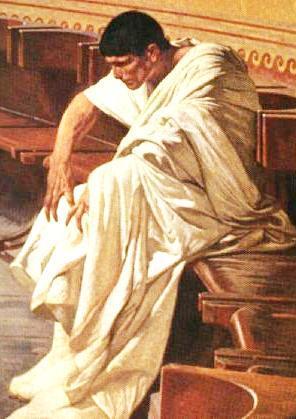
Detail of Catilina from the fresco "Cicero Denouncing Catilina" by Maccari in the Palazzo Madama, Rome
Servilia mentions Catilina in the same breath as Memmius as a lady-killer.
Lucius Sergius Catilina (108 BC – 62 BC), known in English as Catiline, was a Roman politician of the 1st century BC who is best known for the Catiline (or Catilinarian) conspiracy, an attempt to overthrow the Roman Republic, and in particular the power of the aristocratic Senate.
For more, including what have to be many, many spoilers go here: http://en.wikipedia.org/wiki/Catilina
 p. 23
p. 23Servilia wishes she could get her hands on the 15,000 talents of gold her grandfather Caepio the Consul stole from a convoy in Gaul years before.
Quintus Servilius Caepio the Elder was a Roman statesman and general, consul in 106 BC, and proconsul of Cisalpine Gaul in 105 BC. He was the father of Quintus Servilius Caepio the Younger and the grandfather of Servilia Caepionis.
In the Battle of Arausio in 105 BC, Caepio led one of the two forces against the Germanic tribes (the Teutones, the Cimbri, and Tigurini/Marcomanni/Cherusci) along with the consul Gnaeus Mallius Maximus.
While marching to Arausio (modern-day Orange) Caepio plundered the temples of the town of Tolosa, ancient Tolouse, finding over 50,000 fifteen-pound bars of gold and 10,000 fifteen-pound bars of silver. Strabo reports a story told in his time of this semi-legendary treasure, the aurum Tolosanum, supposed to have been the "cursed gold" looted during the sack of Delphi during the Gallic invasion of the Balkans in 279 BC. The riches of Tolosa were shipped back to Rome, but only the silver made it; the gold was stolen by a band of marauders, who were believed to have been hired by Caepio himself. The Gold of Tolosa was never found, and was said to have been passed all the way down to the last heir of the Servilii Caepiones, Marcus Junius Brutus.
At the Battle of Arausio, Caepio refused to co-operate with his superior officer, the consul Gnaeus Mallius Maximus, who was a new man, not a member of the Roman elite. Caepio refused even to camp with Maximus and his troops; when it appeared that Maximus was going to reach a treaty and take the glory for the resolution, Caepio ordered his men to engage the Germans, and the battle that ensued saw the complete destruction of the Roman army.
Upon his return to Rome, Caepio was tried for "the loss of his army" by a tribune of the plebs, Gaius Norbanus. Caepio was convicted, and was given the harshest sentence allowable: he was stripped of his citizenship, forbidden fire and water within eight hundred miles of Rome, nominally fined 15,000 talents(about 825,000 lb) of gold, and forbidden to see or speak to his friends or family until he had left for exile. (The huge fine—which greatly exceeded the Treasury of Rome—was never collected.)
Caepio spent the rest of his life in exile in Smyrna in Asia Minor.
Wikipedia: http://en.wikipedia.org/wiki/Quintus_...
 p.23
p.23McCullough tells us that when her grandfather died his wealth passed to Servilia's father.
Quintus Servilius Caepio the Younger was a soldier and statesman. He was elected praetor in 91 BC, and fought for Rome during the Marsic Wars of the Italian Rebellion against Rome.
Caepio married Livia Drusa, sister of Marcus Livius Drusus the Younger. Livia bore him three children: Servilia Caepionis, the mistress of Julius Caesar, mother of Brutus and mother-in-law of Gaius Cassius Longinus; another daughter, also called Servilia; and a son, Quintus Servilius Caepio. He divorced Livia after a political and personal dispute with Drusus. Livia later married Marcus Porcius Cato Salonianus and gave birth to Marcus Porcius Cato the Younger, Julius Caesar's most adamant and fanatical opponent.
Caepio became an adamant opponent to Drusus and his laws attempting to give full citizenship to the Italians. Pliny said that the dispute between the two started because of a golden ring. Caepio, it was rumored, was even involved in the assassination of Drusus. Caepio was made a Legate in the Roman Army, he was captured and executed by the Italians after being tricked into leaving a secure position.
See this for a nifty family tree of the Servilia's kinfolk: http://en.wikipedia.org/wiki/Quintus_...
 p. 23
p. 23Servilia is disgusted that all the loot passed to her brother, whom she believed to be the natural child of Cato the Elder and her mother.
According to Wikipedia, Quintus Servilius Caepio, (1st century BC) was the son of Quintus Servilius Caepio the Younger and Livia Drusa, and the full brother to Servilia Caepionis, mother of Caesar's assassin Marcus Junius Brutus.
For more spoiler info see: http://en.wikipedia.org/wiki/Quintus_...
Vicki wrote: "The Boni
The boni or optimates were the ultraconservative faction of Roman politics. Boni means "the good men." They were dedicated to keeping the power of the government in the hands of the few..."
Thank you Vicki for the explanation of that term; I was wondering about the origin.
The boni or optimates were the ultraconservative faction of Roman politics. Boni means "the good men." They were dedicated to keeping the power of the government in the hands of the few..."
Thank you Vicki for the explanation of that term; I was wondering about the origin.
Vicki wrote: "Cicero
Marcus Tullius Cicero was one of the most important men of the Late Republic. Even though he was a New Man (i.e. none of his ancestors had been consul), he attained the consulship and go..."
The images look very good.
Marcus Tullius Cicero was one of the most important men of the Late Republic. Even though he was a New Man (i.e. none of his ancestors had been consul), he attained the consulship and go..."
The images look very good.
 p. 26
p. 26Servilia tries to needle Cato by bringing up his beautiful former fiancee, Aemilia Lepida, now married to another.
Aemilia Lepida, was daughter of Mamercus Aemilius Lepidus Livianus, wife of Metellus Scipio and former fiancee of Cato. Her daughter was Cornelia Metella, last wife and widow of Pompey the Great. Although Aemilia Lepida was engaged to be married to Cato the Younger, she in fact married someone else, leaving Cato to marry Atilia. In the words of Plutarch's Parallel Lives, Life of Cato the Younger,:
When he thought that he was old enough to marry,— and up to that time he had consorted with no woman,— he engaged himself to Lepida, who had formerly been betrothed to Metellus Scipio, but was now free, since Scipio had rejected her and the betrothal had been broken. However, before the marriage Scipio changed his mind again, and by dint of every effort got the maid. Cato was greatly exasperated and inflamed by this, and attempted to go to law about it; but his friends prevented this, and so, in his rage and youthful fervour, he betook himself to iambic verse, and heaped much scornful abuse upon Scipio...
 by
by
 Plutarch
Plutarch
 p. 26
p. 26Cato extols his wife, Atilia, as "doing as she is told and leading an exemplary life"
Atilia (sometimes spelt Attilia), was the daughter of C. Atilius Serranus and first wife of Marcus Porcius Cato Uticencis whom he married about 73 BC, after his intended wife, Aemilia Lepida, married Quintus Caecilius Metellus Pius Scipio Nasica. She was born c. 90 BC
In the words of Plutarch's Parallel Lives, Life of Cato the Younger, 7:
[Atilia] was the first woman with whom he had sex, but not the only one, as was true of Laelius, the friend of Scipio Africanus; Laelius, indeed, was more fortunate, since in the course of his long life he only ever made love to one woman, the wife of his youth.
Cato and Atilia had a son, Marcus Porcius Cato who later died in the second Battle of Philippi, and a daughter Porcia Catonis who became the wife of her cousin Marcus Junius Brutus.
For a spoiler (not much more is known about her) see here: http://en.wikipedia.org/wiki/Atilia
 by
by
 Plutarch
Plutarch
 p. 26
p. 26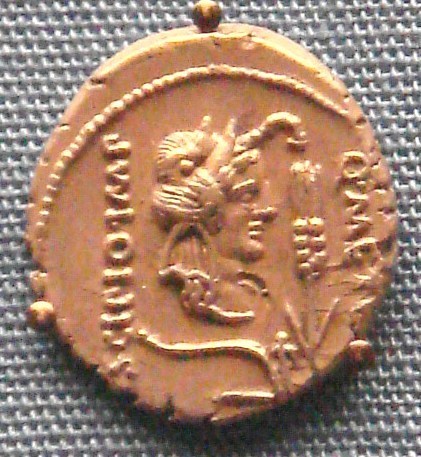
Silver denarius of Quintus Caecilius Metellus Pius Scipio Nasica, depicting Africa personified, wearing elephant-skin headgear
Servilia knows that Aurelia was using Cato to make her future husband Metellus Scipio "come crawling".
Quintus Caecilius Metellus Pius Scipio Nasica (ca. 100/98 BC – 46 BC), in modern scholarship often referred to as Metellus Scipio, was a Roman consul and military commander in the Late Republic. During the civil war between Julius Caesar and the senatorial faction led by Pompeius Magnus ("Pompey the Great"), he remained a staunch optimate. He led troops against Caesar's forces, mainly in the battles of Pharsalus and Thapsus, where he was defeated. He later committed suicide. Ronald Syme called him "the last Scipio of any consequence in Roman history."
Much more here: http://en.wikipedia.org/wiki/Metellus...
Ronald Syme
I love the images of these folks if you can find them. The visuals keep them straight in my mind.
Military "Crowns"
http://penelope.uchicago.edu/Thayer/E...
So far we know of two crowns, the grass crown won by Sulla (in The Grass Crown) and the civic crown won by Caesar (in Fortune's Favorites).
The Grass Crown

This was won when a general saved the legion, e.g. by breaking out of a blockade. Sulla was extremely proud of having won this. It's created on the spot by the legionnaries.
http://en.wikipedia.org/wiki/Grass_Crown
The Civic Crown

This was won by saving the lives of fellow citizens by killing the enemy. Caesar won this in 80 B.C in Mytilene when he saved his troop of soldiers.
http://en.wikipedia.org/wiki/Civic_Crown
http://en.wikipedia.org/wiki/Mytilene

 by
by
 Colleen McCullough
Colleen McCullough
http://penelope.uchicago.edu/Thayer/E...
So far we know of two crowns, the grass crown won by Sulla (in The Grass Crown) and the civic crown won by Caesar (in Fortune's Favorites).
The Grass Crown

This was won when a general saved the legion, e.g. by breaking out of a blockade. Sulla was extremely proud of having won this. It's created on the spot by the legionnaries.
http://en.wikipedia.org/wiki/Grass_Crown
The Civic Crown

This was won by saving the lives of fellow citizens by killing the enemy. Caesar won this in 80 B.C in Mytilene when he saved his troop of soldiers.
http://en.wikipedia.org/wiki/Civic_Crown
http://en.wikipedia.org/wiki/Mytilene

 by
by
 Colleen McCullough
Colleen McCullough
 p. 28
p. 28Junia Prima, Servilia's daughter by Silanus, is seven years old, "extremely attractive", and already betrothed. According to the family tree, she died unmarried.
The second Junia is referred to in the novel as "Junilla", she is six and formally betrothed.
Junia Secunda was the second daughter of Servilia Caepionis, the lover of Julius Caesar and sister of Cato the Younger, and Decimus Junius Silanus, the elder being Junia Prima and the younger Junia Tertia. She was the half-sister of Marcus Junius Brutus, the most famous of Julius Caesar's assassins. She married Marcus Aemilius Lepidus who was a member of the Second Triumvirate, along with Mark Antony and Octavian (later Augustus).
See this for more on her: http://en.wikipedia.org/wiki/Junia_Se...
Junia Tertia, or Tertulla, (c. 60 BCs-22 AD) was the third daughter of Servilia Caepionis and her second husband Decimus Junius Silanus, half-sister of Marcus Junius Brutus, and wife of Gaius Cassius Longinus.
As the relation of so many controversial figures of the late Roman Republic, many rumours swirled around Tertia. She was first said by some to be the natural daughter of Julius Caesar, her mother's lover at the time of her birth. Later on it was said that Servilia offered her up to Caesar when his interest in her mother began to wane - although the former rumour, that his interest in her was paternal, seems the more likely to be true (as it is unlikely that both were true at once: incest not being a vice that Caesar was ever accused of even by his worst enemies). Either could have been the reason for Cicero to remark, at an auction where Caesar had sold goods to Servilia at reduced prices, that they had been discounted by a third (tertia).
More juicy gossip here: http://en.wikipedia.org/wiki/Junia_Te...
Vicki wrote: "Military "Crowns"
http://penelope.uchicago.edu/Thayer/E...
So far we know of two crowns, the grass crown won by Sulla (in The Grass Crown) and the civic cro..."
Good post and images Vicky. Well done; I never got these straight and now we have the visuals which help tremendously.
http://penelope.uchicago.edu/Thayer/E...
So far we know of two crowns, the grass crown won by Sulla (in The Grass Crown) and the civic cro..."
Good post and images Vicky. Well done; I never got these straight and now we have the visuals which help tremendously.
 p. 33 - Crucifixion
p. 33 - Crucifixion
Crux Simplex by Justus Lipsius
Servilia keeps her slaves in line with the threat of crucifixion, which she carried out on at least one occasion per the novel. Once would be enough I would think!
In ancient Rome, crucifixion was used for slaves, pirates, and enemies of the state. It was considered a most shameful and disgraceful way to die. Condemned Roman citizens were usually exempt from crucifixion (like feudal nobles from hanging, dying more honorably by decapitation) except for major crimes against the state, such as high treason.
Notorious mass crucifixions followed the Third Servile War in 73–71 BC (the slave rebellion under Spartacus), other Roman civil wars in the 2nd and 1st centuries BC, and the Destruction of Jerusalem in 70 AD. To frighten other slaves from revolting, Crassus crucified 6,000 of Spartacus' men along the Appian Way from Capua to Rome. Josephus tells a story of the Romans crucifying people along the walls of Jerusalem. He also says that the Roman soldiers would amuse themselves by crucifying criminals in different positions. In Roman-style crucifixion, the condemned could take up to a few days to die. The dead body was left up for vultures and other birds to consume.
Under ancient Roman penal practice, crucifixion was also a means of exhibiting the criminal’s low social status. It was the most dishonourable death imaginable, originally reserved for slaves, hence still called "supplicium servile" by Seneca, later extended to provincial freedmen of obscure station ('humiles'). The citizen class of Roman society were almost never subject to capital punishments; instead, they were fined or exiled. Josephus mentions Jews of high rank who were crucified, but this was to point out that their status had been taken away from them. The Romans often broke the prisoner's legs to hasten death and usually forbade burial.
A cruel prelude was occasionally scourging, which would cause the condemned to lose a large amount of blood, and approach a state of shock. The convict then usually had to carry the horizontal beam (patibulum in Latin) to the place of execution, but not necessarily the whole cross. Crucifixion was typically carried out by specialized teams, consisting of a commanding centurion and four soldiers. When it was done in an established place of execution, the vertical beam (stipes) could even be permanently embedded in the ground. The condemned was usually stripped naked—all the New Testament gospels describe soldiers gambling for the robes of Jesus.
The 'nails' were tapered iron spikes approximately 5 to 7 inches (13 to 18 cm) long, with a square shaft 3⁄8 inches (10 mm) across. In some cases, the nails were gathered afterward and used as healing amulets.
Constantine the Great, the first Christian emperor, abolished crucifixion in the Roman Empire in 337 out of veneration for Jesus Christ, its most famous victim.
For more than you ever wanted to know about this disgusting practice go here: http://en.wikipedia.org/wiki/Crucifixion
 p. 36 - Catulus
p. 36 - Catulus
19th century illustration depicting the Temple of Jupiter Optimus Maximus above the Tiber River during the Roman Republic.
On a walk through Rome, Caesar notes that Catulus is tardy finishing a temple to Jupiter.
Quintus Lutatius Catulus (Capitolinus) inherited his father's hatred of the leading statesman and general Marius, and was a consistent though moderate supporter of the aristocracy. In 78 he was consul with Marcus Aemilius Lepidus (120-77 BC), who after the death of Sulla proposed the overthrow of his constitution, the re-establishment of the distribution of grain, the recall of the banished, and other democratic measures. Catulus vigorously opposed this, and a temporary compromise was effected.
But Lepidus, having levied troops in his province of Transalpine Gaul, returned to Rome at the head of an army. Catulus defeated him at the Milvian bridge and near Cosa in Etruria, and Lepidus made his escape to Sardinia, where he died soon afterwards. In 67 and 66 Catulus unsuccessfully opposed, as prejudicial to constitutional freedom, the Gabinian and Manilian laws, which conferred special powers upon Pompey. He consistently opposed Julius Caesar, whom he endeavoured to implicate in the Catilinarian conspiracy. Caesar, in return, accused him of embezzling public money during the reconstruction of the temple on the Capitol, and proposed to obliterate his name from the inscription and deprive him of the office of commissioner for its restoration. Catulus' supporters rallied round him, and Caesar dropped the charge. Later Caesar took his revenge by becoming Pontifex Maximus in 63BC defeating Catulus in the process.
Catulus held the office of censor, but soon resigned, being unable to agree with his colleague Crassus. Although not a man of great abilities, Catulus exercised considerable influence through his political consistency and his undoubted solicitude for the welfare of the state.
Wikipedia: http://en.wikipedia.org/wiki/Quintus_...
For more on the various Temples of Jupiter Optimus Maximus on Capotoline Hill, go here: http://en.wikipedia.org/wiki/Temple_o...
 p. 41 - Lucius Domitius Ahenobarbus
p. 41 - Lucius Domitius AhenobarbusFirst mentioned as one of the boni and as Cato's brother-in-law
Lucius Domitius Ahenobarbus, consul 54 BC, was an enemy of Julius Caesar and a strong supporter of the aristocratic party in the late Roman Republic.
He is first mentioned in 70 BC by Cicero as a witness against Verres. He married Porcia, the sister of Cato the Younger, and in his aedileship supported the latter in his proposals against bribery at elections, which were directed against Pompey, who was purchasing votes for Afranius. The political opinions of Ahenobarbus coincided with those of Cato; he was throughout his life one of the strongest supporters the aristocratical party. He took an active part opposing the measures of Julius Caesar and Pompey, and in 59 BC was accused, at the instigation of Caesar, of being an accomplice to the pretended conspiracy against Pompey's life.
The poet Lucan makes Lucius Domitius Ahenobarbus a significant character in book 7 of his Pharsalia (he is called "Domitius"). Domitius is significant in the poem because he is the only known senator who died supporting Pompey at Pharsalia, and thus is a symbol of the dying republic.
Additionally, Lucius Domitius Ahenobarbus is Nero's great-great-grandfather and shares Nero's birth name.
For more info go here: http://en.wikipedia.org/wiki/Lucius_D...
 by Marcus Annaeus Lucanus
by Marcus Annaeus Lucanus
 p. 41 - Appius Claudius Pulcher
p. 41 - Appius Claudius PulcherHis arrival, in the company of Cicero, provides welcome relief to Caesar during his unpleasant conversation with Cato.
Appius Claudius Pulcher (97 BC – 49 BC) was a consul of the Roman Republic in 54 BC. He was an expert in Roman law and antiquities, especially the esoteric lore of the augural college of which he was a controversial member. He was head of the senior line of the most powerful family of the patrician Claudii.
The Claudii were one of the five leading families (gentes maiores or "Greater Clans") which had dominated Roman social and political life from the earliest years of the republic. He is best known as the recipient of 13 of the extant letters in Cicero's ad Familiares corpus (the whole of book III), which date from winter 53-52 to summer 50 BC. Regrettably they do not include any of Appius' replies to Cicero as extant texts of any sort by members of Rome's ruling aristocracy are quite few and rare, apart from those of Julius Caesar.
For much more info go here: http://en.wikipedia.org/wiki/Appius_C...
 by
by
 Marcus Tullius Cicero
Marcus Tullius Cicero
message 80:
by
Vicki, Assisting Moderator - Ancient Roman History
(last edited Apr 25, 2012 10:14AM)
(new)
-
rated it 3 stars
Publius Clodius Pulcher
Clodius was born into the patrician Claudia gens, but spelled his name in the plebeian manner, possibly to conform to the way his two elder sisters Clodia and Clodilla spelled theirs. In his early thirties, he had himself adopted by a plebeian (who was younger than Clodius) so as to be able to be elected as Tribune of the Plebs. In the meantime, he endured such scandals as being discovered dressed as a woman attending the rites of the Bona Dea, this being considered a sacrilege since only women were allowed, and standing trian for incest with his sister Clodia, the wife of Lucullus. He and Cicero became great enemies and he was successful in getting Cicero banished for a while. He was killed in 53 B.C. when his group met a rival gang led by Milo on the Appian Way. His adherents built his funeral pyre in the Senate house and burned it down.
http://en.wikipedia.org/wiki/Publius_...
Clodius was born into the patrician Claudia gens, but spelled his name in the plebeian manner, possibly to conform to the way his two elder sisters Clodia and Clodilla spelled theirs. In his early thirties, he had himself adopted by a plebeian (who was younger than Clodius) so as to be able to be elected as Tribune of the Plebs. In the meantime, he endured such scandals as being discovered dressed as a woman attending the rites of the Bona Dea, this being considered a sacrilege since only women were allowed, and standing trian for incest with his sister Clodia, the wife of Lucullus. He and Cicero became great enemies and he was successful in getting Cicero banished for a while. He was killed in 53 B.C. when his group met a rival gang led by Milo on the Appian Way. His adherents built his funeral pyre in the Senate house and burned it down.
http://en.wikipedia.org/wiki/Publius_...
 p. 51 -
tablinum
p. 51 -
tablinum
Aurelia follows Caesar into his tablinum.
In Roman architecture, a tablinum (or tabulinum, from tabula, board, picture) was a room generally situated on one side of the atrium and opposite to the entrance; it opened in the rear on to the peristyle, with either a large window or only an anteroom or curtain. The walls were richly decorated with fresco pictures, and busts of the family were arranged on pedestals on the two sides of the room.
The tablinum was the office in a Roman house, the father's centre for business, where he would receive his clients. It was originally the master bedroom, but later became the main office and reception room for the house master.
Source: http://en.wikipedia.org/wiki/Tablinum
message 82:
by
Bentley, Group Founder, Leader, Chief
(last edited Apr 25, 2012 10:26AM)
(new)
-
rated it 3 stars
Vicki wrote: "Publius Clodius Pulcher
Clodius was born into the patrician Claudia gens, but spelled his name in the plebeian manner, possibly to conform to the way his two elder sisters Clodia and Clodilla spel..."
Sounds like an unpopular and very odd fellow.
Clodius was born into the patrician Claudia gens, but spelled his name in the plebeian manner, possibly to conform to the way his two elder sisters Clodia and Clodilla spel..."
Sounds like an unpopular and very odd fellow.
 p.53 Marcus Aemilius Lepidus
p.53 Marcus Aemilius Lepidus
Servilia's very young daughter is formally betrothed to Lepidus.
Marcus Aemilius Lepidus born c. 89 or 88 BC, died late 13 or early 12 BC) was a Roman patrician who rose to become a member of the Second Triumvirate and Pontifex Maximus. His father, Marcus Aemilius Lepidus, had been involved in a rebellion against the Roman Republic.
Lepidus' mother may have been a daughter of Lucius Appuleius Saturninus. His brother was Lucius Aemilius Lepidus Paullus. He married Junia Secunda, sister of Marcus Junius Brutus and Junia Tertia, Cassius Longinus's wife.
For more info (with spoilers) go here: http://en.wikipedia.org/wiki/Marcus_A...
message 84:
by
Vicki, Assisting Moderator - Ancient Roman History
(last edited Oct 18, 2012 02:29PM)
(new)
-
rated it 3 stars
Gens Claudia
This clan dates back to the earliest days of the Republic and had many prominent members. The Appian Way, the road between Rome and Capua, and on to Brundisium in the heel of Italy, was named after Appius Claudius Caecus, who completed the first section in 312 B.C. The section between Rome and Capua was where Crassus had 6,000 Spartacan slaves crucified.

The emperor Tiberius was also a Claudian.

http://en.wikipedia.org/wiki/Claudius...
http://en.wikipedia.org/wiki/Appian_Way
This clan dates back to the earliest days of the Republic and had many prominent members. The Appian Way, the road between Rome and Capua, and on to Brundisium in the heel of Italy, was named after Appius Claudius Caecus, who completed the first section in 312 B.C. The section between Rome and Capua was where Crassus had 6,000 Spartacan slaves crucified.

The emperor Tiberius was also a Claudian.

http://en.wikipedia.org/wiki/Claudius...
http://en.wikipedia.org/wiki/Appian_Way
message 86:
by
Vicki, Assisting Moderator - Ancient Roman History
(last edited Oct 18, 2012 02:30PM)
(new)
-
rated it 3 stars
Clodia Metella

Clodia was Clodius' sister and was married to Quintus Caecilius Metellus Celer but the marriage was not a happy one and she was rumored to have had many affairs (including one with her brother Clodius). She is also believed to the Lesbia mentioned in many of the poems by Catullus.
http://en.wikipedia.org/wiki/Clodia

Clodia was Clodius' sister and was married to Quintus Caecilius Metellus Celer but the marriage was not a happy one and she was rumored to have had many affairs (including one with her brother Clodius). She is also believed to the Lesbia mentioned in many of the poems by Catullus.
http://en.wikipedia.org/wiki/Clodia
message 87:
by
Vicki, Assisting Moderator - Ancient Roman History
(last edited Oct 18, 2012 02:32PM)
(new)
-
rated it 3 stars
Gaius Valerius Catullus
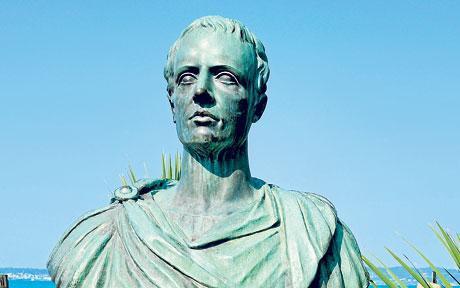
Catullus is one of the most famous Latin poets. He wrote many poems about his lover Lesbia, whom many believe to have been Clodia Metelli, the sister of Clodius. Here's one written before she broke off the relationship.
Sparrow, my sweet girl’s delight,
whom she plays with, holds to her breast,
whom, greedy, she gives her little finger to,
often provoking you to a sharp bite,
whenever my shining desire wishes
to play with something she loves,
I suppose, while strong passion abates,
it might be a small relief from her pain:
might I toy with you as she does
and ease the cares of a sad mind!
And one written after the break-up.
I hate and love. And why, perhaps you’ll ask.
I don’t know: but I feel, and I’m tormented.
http://en.wikipedia.org/wiki/Catullus
http://www.poetryintranslation.com/PI...

Catullus is one of the most famous Latin poets. He wrote many poems about his lover Lesbia, whom many believe to have been Clodia Metelli, the sister of Clodius. Here's one written before she broke off the relationship.
Sparrow, my sweet girl’s delight,
whom she plays with, holds to her breast,
whom, greedy, she gives her little finger to,
often provoking you to a sharp bite,
whenever my shining desire wishes
to play with something she loves,
I suppose, while strong passion abates,
it might be a small relief from her pain:
might I toy with you as she does
and ease the cares of a sad mind!
And one written after the break-up.
I hate and love. And why, perhaps you’ll ask.
I don’t know: but I feel, and I’m tormented.
http://en.wikipedia.org/wiki/Catullus
http://www.poetryintranslation.com/PI...
 p. 53 Publius Servilius Vatia Isauricus
p. 53 Publius Servilius Vatia IsauricusThe betrothed of Servilia's other daughter.
Publius Servilius Vatia Isauricus was a Roman Consul elected in 48 BC along with Gaius Julius Caesar. He is generally regarded as a puppet of Caesar, having a long friendship with the Dictator. He was the son of Publius Servilius Vatia Isauricus.
For more see here: http://en.wikipedia.org/wiki/Publius_...
 p. 61 - Quintus Caecilius Metellus Pius
p. 61 - Quintus Caecilius Metellus Pius
McCullough tells us the seasons are "dragging behind" because Metellus Pius Pontifex Maximus had been lax in inserting an extra twenty days each second February.
Quintus Caecilius Metellus Pius (ca 130 BC or 127 BC – 63 BC) was a pro-Sullan politician and general. He was named Pius because of his 99 BC petition to return his father from exile and was true to his cognomen for the constance and inflexibility with which he always fought for his father's rehabilitation and return to Rome.
He was elected Quaestor in 97 BC, Tribune in 92 and Pontifex Maximus in 81, Praetor in 89 BC, Consul in 80. He withdrew from Rome during the civil war between Marius and Sulla, returning afterward with the latter.
As a military figure, he had his first commands in the war in 109-107 BC, when he accompanied his father Quintus Caecilius Metellus Numidicus in Numidia during Jugurthine War, where his father took him as a simple cadet. He was later revealed to be one of the best subordinates of Sulla, but without any other objective than fighting the demagogy with which Marius threatened Rome, never participating in the atrocious violence that marked such a troubled phase of the history of Rome. He was also one of the Roman commanders in the Social War of 90 - 89 BC. A Propraetor at that time, Pius stormed Venusia and killed the general of the Marsi, Quintus Poppaedius Silo. In 87 BC Pius by the order of Senate tried to make peace with the Samnites.
For more go here: http://en.wikipedia.org/wiki/Quintus_...
 p. 62 - Pompey Strabo
p. 62 - Pompey StraboMentioned here as father of Pompey the Great.
Gnaeus Pompeius Strabo (died 87 BC)was born and raised into a noble family in Picenum (modern Marche & Abruzzo) a rural district in Northern Italy, off the Adriatic coast.
Strabo became the first of his branch of the gens Pompeia to achieve senatorial status in Rome, despite the anti-rural prejudice of the Roman Senate. After proving his military talent, he climbed the cursus honorum and became promagistrate in Sicily 93 BC and consul in the year 89 BC, in the midst of the Social War.
Strabo commanded Roman forces against the Italian Allies in the northern part of Italy. His three Roman legions were instrumental in Rome's victory. After his consulship and the war, he retired to Picenum with all of his veteran soldiers. Optimates gave his army to Pompeius Rufus, the new consul. This caused Pompeius Rufus to be murdered by Strabo’s soldiers. He remained there until 87 BC, when he responded to the Optimates' request for help against Marian Party. Strabo had the habit of playing both ends against the middle in the intense politics of the period. For this Rutilius Rufus referred to him as "the vilest man alive".
Strabo married a Roman woman whose name is unknown. He had at least two children: a son, Gnaeus Pompeius Magnus, also known as Pompey the Great or Pompey the triumvir, who took as his fourth wife Julia (the daughter of dictator Gaius Julius Caesar), and a daughter called Pompeia.
Source: http://en.wikipedia.org/wiki/Pompey_S...
 p. 62 - Quintus Sertorius
p. 62 - Quintus Sertorius Pompey reflects on his struggle against Sertorius in Spain.

Possible copy of mural by Hans Holbein the Younger, this design portrays Quintus Sertorius, who was famous for his skill in winning battles against larger forces. He illustrated the principle to his followers by demonstrating that a horse's tail could be picked out hair by hair but not pulled out all at once.
Quintus Sertorius (c. 126 BC – 73 BC) was a Roman statesman and general, born in Nursia, in Sabine territory. His brilliance as a military commander was shown most clearly in his battles against Rome for control of Hispania. His family, the gens Sertoria, was probably of Sabine origin, and was previously undistinguished.
 p. 65 - Aulus Gabinius
p. 65 - Aulus GabiniusMentioned here as Pompey's favorite among the candidates standing for the tribune of the plebes
Aulus Gabinius, Roman statesman and general, and supporter of Gnaeus Pompeius Magnus, was a prominent figure in the later days of the Roman Republic.
In 67 BC, when tribune of the plebs, he brought forward the law (Lex Gabinia) which gave Pompey the command in the war against the Mediterranean pirates, with extensive powers that gave him absolute control over the sea and the coasts for 50 miles inland. By two other measures of Gabinius, loans of money to foreign ambassadors in Rome were made non-actionable (as a check on the corruption of the Senate) and the Senate was ordered to give audience to foreign envoys on certain fixed days (February 1 - March 1).
For more, including juicy spoilers, go here: http://en.wikipedia.org/wiki/Aulus_Ga...
message 93:
by
Vicki, Assisting Moderator - Ancient Roman History
(last edited Apr 25, 2012 03:16PM)
(new)
-
rated it 3 stars
Fimbriani
The Fimbriani were the soldiers who served in Asia Province under Gaius Flavius Fimbria. Fimbria stirred up a revolt against Lucius Valerius Flaccus, the consul in charge, and killed Flaccus. Fimbria was later killed himself, but for supporting him, all his troops were never allowed to return to Italy. In Fortune's Favorites, it was a group of Fimbriani whom Caesar saved at Mytilene and who awarded him the civic crown. In this book, it's a group of Fimbriani that Clodius uses to spread rumors about Lucullus.
http://en.wikipedia.org/wiki/Gaius_Fl...
 by
by
 Colleen McCullough
Colleen McCullough
The Fimbriani were the soldiers who served in Asia Province under Gaius Flavius Fimbria. Fimbria stirred up a revolt against Lucius Valerius Flaccus, the consul in charge, and killed Flaccus. Fimbria was later killed himself, but for supporting him, all his troops were never allowed to return to Italy. In Fortune's Favorites, it was a group of Fimbriani whom Caesar saved at Mytilene and who awarded him the civic crown. In this book, it's a group of Fimbriani that Clodius uses to spread rumors about Lucullus.
http://en.wikipedia.org/wiki/Gaius_Fl...
 by
by
 Colleen McCullough
Colleen McCullough
message 94:
by
Vicki, Assisting Moderator - Ancient Roman History
(last edited Nov 23, 2012 02:39PM)
(new)
-
rated it 3 stars
Fulvia
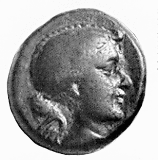
Fulvia Flacca Bambula was one of the most interesting women in ancient Rome. Married first to Clodius, then to Gaius Scribonius Curio and finally to Mark Antony, she appears to have been a very political animal. She is supposed to have stuck pins through the tongue of Cicero's disembodied head after he was proscribed and later attempted to help Antony in his struggle with Octavian.

Fulvia with the head of Cicero
http://en.wikipedia.org/wiki/Fulvia

Fulvia Flacca Bambula was one of the most interesting women in ancient Rome. Married first to Clodius, then to Gaius Scribonius Curio and finally to Mark Antony, she appears to have been a very political animal. She is supposed to have stuck pins through the tongue of Cicero's disembodied head after he was proscribed and later attempted to help Antony in his struggle with Octavian.

Fulvia with the head of Cicero
http://en.wikipedia.org/wiki/Fulvia
message 95:
by
Bentley, Group Founder, Leader, Chief
(last edited Apr 25, 2012 04:37PM)
(new)
-
rated it 3 stars
Vicki wrote: "Fimbriani
The Fimbriani were the soldiers who served in Asia Province under Gaius Flavius Fimbria. Fimbria stirred up a revolt against Lucius Valerius Flaccus, the consul in charge, and killed Fl..."
This is an excellent post Vicki.
The Fimbriani were the soldiers who served in Asia Province under Gaius Flavius Fimbria. Fimbria stirred up a revolt against Lucius Valerius Flaccus, the consul in charge, and killed Fl..."
This is an excellent post Vicki.
 Metellus Little Goat
Metellus Little Goatp.65 - Pompey has a very poor opinion of his performance against the pirates.
Quintus Caecilius Metellus Creticus (c. 135 BC – late 50s BC) was a politically active member of the Roman upper class. He was praetor in 74 BC and pontifex from 73 BC until his death. He was consul in 69 BC along with Quintus Hortensius Hortalus.
During his consulship, Quintus Caecilius Metellus was given the proconsular command against the pirate-infested Crete; his co-consul, Quintus Hortensius Hortalus had refused it. Metellus captured several cities and made great progress before the island appealed to Pompey the Great. They did this in 67 BC, when Pompey had control over the Mediterranean to eliminate piracy under the proposal of Gabinius. The Cretans offered to surrender to Pompey, perhaps believing he would be less harsh than Metellus. Pompey ignored Metellus' command over the island and accepted the Cretan's surrender. Pompey ordered Metellus to leave the island with his troops, but Metellus persisted. Metellus then defeated the island of Crete and made it a province of Rome.
Because of Metellus' refusal to leave Crete when Pompey ordered it, Pompey and his allies prevented his triumph until 62 BC. Upon celebrating his triumph, Metellus received the cognomen 'Creticus', the Latin word for 'Cretan'. In return for the opposition to his triumph, Metellus used his influence to prevent the ratification in the senate of Pompey's reorganization of the east until 60 BC. Metellus remained a prominent member of Pompey's opposition until his death in the late 50s BC.
 Marcus Aurelius Cotta
Marcus Aurelius Cottap. 67 - Described as Caesar's uncle. Caesar suspects that Gaius Papirius Carbo will prosecute him for illegal retention of war booty.
Marcus Aurelius Cotta was a Roman politician and general who was consul in 74 BC and was one of the early Roman commanders who fought in the Third Mithridatic War.
Climbing the cursus honorum, it is assumed that he held the post of praetor in 77 BC. Elected consul in 74 BC alongside Lucius Licinius Lucullus, he was soon concerned with the escalating situation in the east brought about by the acquisition of the new province of Bithynia and the subsequent renewal of conflict with King Mithridates VI of Pontus who had invaded Bithynia. Having received Bithynia and Pontus as his proconsular command, he received command of a fleet to protect his province and was dispatched to the east towards the end of his period as consul.
The original plan was that Cotta should tie down Mithridates' fleet, while Lucullus attacked by land. Cotta was therefore ordered to station his fleet at Chalcedon, while Lucullus marched through Phrygia with the intention of invading Pontus. Lucullus had not advanced far when news came through that Mithridates had made a rapid march westward, attacked Cotta, and forced him to flee behind the walls of Chalcedon. Sixty-four Roman ships had been captured or burnt, and Cotta had lost three thousand men. There Cotta was forced to remain until Lucullus could to come to his rescue.
Having made his way to Nicomedia, Cotta watched in frustration as Mithridates, learning that his fleet had been destroyed by Lucullus, escaped the city and sailed down the Bosporus to the town of Heraclea Pontica. Joined by Lucullus at Nicomedia in 73 BC, Cotta was assigned the task of securing Lucullus' rear by taking the town of Heraclea, which Mithridates had reinforced with 4,000 troops. After reducing the Pontic coast, Cotta began besieging Heraclea, which took him two years to complete, sacking the city in 71 BC. During this time he was forced to dismiss one of his quaestors, P. Oppius, charging him with bribery and conspiracy.
Returning to Rome in 70 BC, Cotta was at first widely acclaimed for his victory at Heraclea. However, around 67 BC he was accused of appropriation of war booty by Gaius Papirius Carbo. He was convicted of the offence and expelled from the Senate.
Source: http://en.wikipedia.org/wiki/Marcus_A...
Note: I have been unable to easily find information on the Gaius Papirius Carbo referenced here. I have run across two people bearing the same name but their dates do not seem to coincide with this Carbo.
 Marcus Antonius Gnipho
Marcus Antonius Gnipho
p. 70 - described in the novel as the private tutor of Caesar; Caesar's daughter Julia attends his school.
Marcus Antonius Gnipho was a grammarian and teacher of rhetoric of Gaulish origin who taught in ancient Rome.
Born in Gaul, he was exposed as a child, but was found, and grew up a slave. He was later freed, and according to Roman naming conventions took the nomen and praenomen of his former master, one Marcus Antonius.
He may have been educated in Alexandria. He had a great memory and was well-read in both Greek and Latin. He was first employed as the private tutor of the young Julius Caesar, and later set up a school in his own house, where it is said he never haggled over pay, but relied on his pupils' generosity. The great orator Marcus Tullius Cicero is said to have frequented his school while praetor in 66 BC. Atteius the Philologist was another of his pupils.
He wrote a number of works, including De Latino Sermone ("On the Latin Language") in two books. The surviving Rhetorica ad Herennium has been ascribed to him, but this is not widely accepted; otherwise, none of Gnipho's works survive. Scholarly opinion in antiquity was that only De Latino Sermone was his, and that all other works ascribed to him were written by his disciples. He died at the age of fifty.
Source: http://en.wikipedia.org/wiki/Marcus_A...
 Quintus Marcius Rex
Quintus Marcius Rex
p. 71 - Consul who is pitied for having held office alone at the time when pirates sacked Rome's port of Ostia.
Quintus Marcius Rex was elected consul for 68 BC with Lucius Caecilius Metellus. Caecilius Metellus died near the start of the year and was not replaced. Marcius went to serve in Cilicia as proconsul and, pressured by his brother-in-law, Publius Clodius, refused to help Lucius Licinius Lucullus. He gave up his province in 66 BC to comply with the lex Manilia that gave command of the provinces of the east to Gnaeus Pompeius Magnus.
He was denied a triumph upon his return. He was still waiting outside the city for a triumph when the Catilinarian Conspiracy broke out in 63 BC. He was sent to watch the movements of Gaius Manlius, Catilina's general. He refused to listen to Manlius's offers of peace.
Marcius had married the eldest sister of Publius Clodius. He died in 61 without leaving an inheritance to his brother-in-law as he expected.
Source: http://en.wikipedia.org/wiki/Quintus_...
Books mentioned in this topic
Livy XIV: History of Rome, Summaries. Fragments. Julius Obsequens. General Index (other topics)Appian: Roman History, Vol. IV, The Civil Wars, Books 3.27-5 (other topics)
The Roman Revolution (other topics)
Roman History, Volume V: Books 46–50 (other topics)
The Twelve Caesars (other topics)
More...
Authors mentioned in this topic
Appian (other topics)Ronald Syme (other topics)
Cassius Dio (other topics)
Suetonius (other topics)
Livy (other topics)
More...






Roman citizens were divided into two orders, patricians and plebeians. Certain elective offices were restricted to members of one or the other order. For instance, Caesar was a patrician and hence, couldn't become a Tribune of the Plebs, a very powerful office. Tribunes could propose laws to the Plebeian Council (concilium plebis) or veto proposals from the Senate.
Patricians
http://en.wikipedia.org/wiki/Patricia...
Plebeians
http://en.wikipedia.org/wiki/Plebs
http://en.wikipedia.org/wiki/Plebeian...
http://en.wikipedia.org/wiki/Tribune